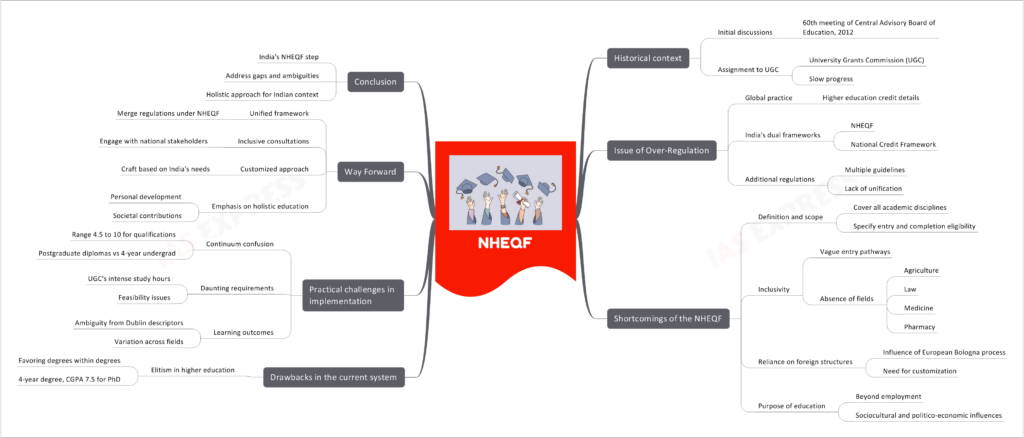National Higher Education Qualifications Framework- What are the Major Challenges?
India’s movement towards establishing a framework for higher education qualifications, which gained traction globally in the late 1990s, has recently achieved a significant milestone with the introduction of the National Higher Education Qualifications Framework (NHEQF). This initiation, while commendable, requires more clarity and uniformity to address the intricacies of the diverse higher education landscape of the country.

Historical Context
- Initial Discussions: The need for an NHEQF was first discussed in the 60th meeting of the Central Advisory Board of Education in 2012.
- Assignment to UGC: The University Grants Commission (UGC) was tasked with the responsibility of the framework. However, tangible progress remained slow.
The Issue of Over-Regulation
- Global Practice: Higher education frameworks globally define and require specific details about credits.
- India’s Dual Frameworks: UGC has proposed two separate entities:
- NHEQF
- National Credit Framework
- Additional Regulations: India has multiple other guidelines affecting higher education qualifications, which could have been unified under the NHEQF, but they remain scattered, leading to confusion.
Shortcomings of the NHEQF
- Definition and Scope:
- An ideal national higher education qualification should cover all academic disciplines.
- It should specify eligibility for entry and completion of all study programs.
- Inclusivity:
- While the NHEQF states exit requirements, it’s vague about entry pathways.
- Major fields like agriculture, law, medicine, and pharmacy are left out, even though they could be integrated via consensus among regulatory bodies.
- Reliance on Foreign Structures:
- The NHEQF is heavily influenced by the European Bologna process.
- While learning from global practices is valuable, India’s diverse higher education system requires customization that caters to its unique challenges and needs.
- Purpose of Education:
- The framework does not emphasize the importance of education beyond just employment. It neglects the sociocultural and politico-economic influences on learning.
Drawbacks in the Current System
- Elitism in Higher Education:
- The system now seems to favor ‘degrees within a degree’.
- Only those with a four-year undergraduate degree with a minimum CGPA of 7.5 can directly access PhD programs, potentially making higher education elitist.
Practical Challenges in Implementation
- Continuum Confusion:
- The document categorizes all higher education qualifications within a range of 4.5 to 10.
- It equates postgraduate diplomas with four-year undergraduate programs, causing confusion.
- Daunting Requirements:
- UGC’s credit framework suggests intense study hours that might be unfeasible for many institutions, especially those with limited resources.
- Learning Outcomes:
- There’s ambiguity regarding learning outcomes derived from the Dublin descriptors.
- These outcomes, whether generic or discipline-specific, might vary significantly across fields.
Way Forward
- Unified Framework: Combine various regulations, frameworks, and guidelines under the umbrella of the NHEQF to ensure clarity and cohesion.
- Inclusive Consultations: Engage with stakeholders across the nation, given the federal structure and diverse higher education landscape.
- Customized Approach: While global frameworks can offer insights, India should craft its qualification frameworks based on its unique needs and challenges.
- Emphasis on Holistic Education: The framework should underline the broader purpose of education, focusing on personal development and societal contributions, beyond mere employability.
Conclusion
India’s NHEQF is a notable step towards structuring the nation’s higher education system. However, for it to be effective, cohesive, and inclusive, it’s imperative to address the existing gaps, ambiguities, and potential challenges. Embracing a holistic approach that captures the essence of education in the Indian context will be instrumental in driving the nation’s academic excellence forward.
Practice Question for Mains
Discuss the advantages and disadvantages of the National Higher Education Qualifications Framework. What is the way ahead? (250 words)
If you like this post, please share your feedback in the comments section below so that we will upload more posts like this.

